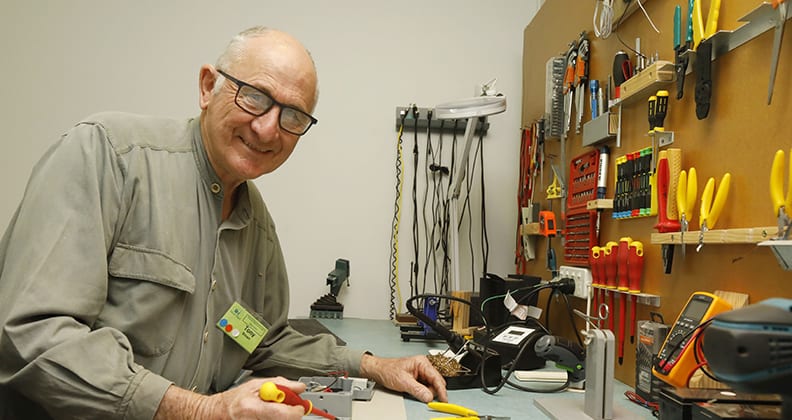The winner of inaugural alumni Innovation Award shares his thoughts on why assistive technologies could be key to giving people with a physical disability greater independence.
“I have always loved understanding, designing and tinkering with technology. I was part of the first group of students that moved from the old Perth Technical School building at the bottom of St Georges Terrace to the new Western Australian Institute of Technology’s Bentley Campus. The new buildings housed some fantastic equipment, but not all of it had been set up, so we had to experiment to get it working. We were pioneers in a sense! My education gave me a good grounding in my career and has been enormously beneficial to my current role.
Throughout my life, I’ve been in contact with a lot of people with disability. My late son, Ben, whom Bentech was named after, designed and controlled a home in which he could live. His house was voice controlled, which gave him more independence and lowered his living costs and the cost of burden to the government. My wife and I also spent seven years volunteering at [disabilities service provider] Rocky Bay. With my son’s passing, I was determined to continue his work, so others with a disability, including aged people, could have such benefits.
When we set up Bentech, we did an extensive survey and found that many people with disability had carers with them who weren’t needed most of the time. They were occasionally needed to open a door, close a window, turn the TV on, those sorts of things. So I could see the potential of applying technologies to do these tasks that people with abilities take for granted.
We have one trial house in Fremantle, which has been running for more than 12 months. The man who lives there – who was in a horrendous accident when he was younger – has been overjoyed by what we’ve done. He’s now been given more flexibility, requires less care time and has greater independence. He also has more security because the house has cameras, so he can control who he lets through the front door.
There are a number of commercial home automated systems already out there, but they are not specifically designed for people with disability. For instance, many systems work on apps, whereas our system works on a webpage so any device that can access a webpage can access our system. This overcomes the problems of apps requiring upgrades and new models. Also, the commercial systems often have icons that are so small that somebody with poor dexterity cannot operate them effectively.
There are so many problems in the disability sector that could be solved with the introduction of more assistive technologies. That’s what I saw with my son, who achieved so much more independence as a result. He also had more valuable time with carers to take him out socially, which he really enjoyed.
I often tell people the case of waiting for a package to arrive. Normally, a person with a disability would have to sit at home and wait for the delivery. But if they have our technology, they could be down at their local coffee shop and communicate with the delivery man through the intercom and camera. They could get them to show their ID and the person with the disability could say, ‘I’m going to open the door. Can you put the package inside the door, walk out and then I’ll close it behind you’. That’s an enormous advantage to someone in a wheelchair.
I’m honoured that my work has been recognised by Curtin, particularly in the University’s fiftieth year. But the Innovation Award doesn’t just belong to me – it belongs to the Bentech family.
We actually have a relationship with Curtin built around research and development. Some Curtin students have even undertaken placements at Bentech. My hope is to continue to develop this relationship and to transition to more of a mentor role to support the next generation of students.”



